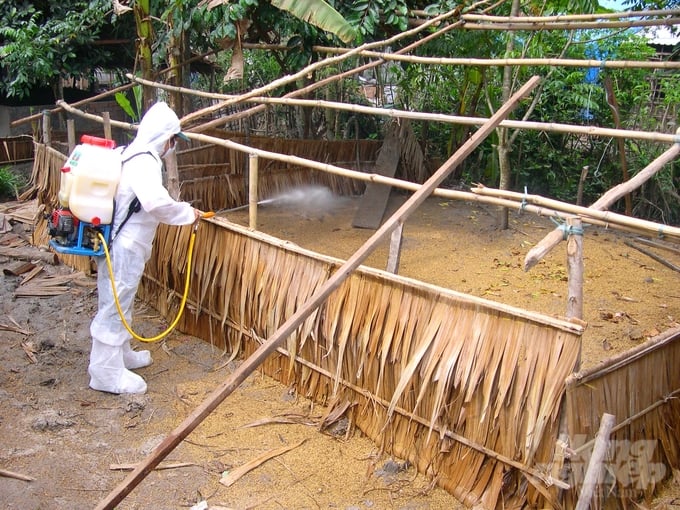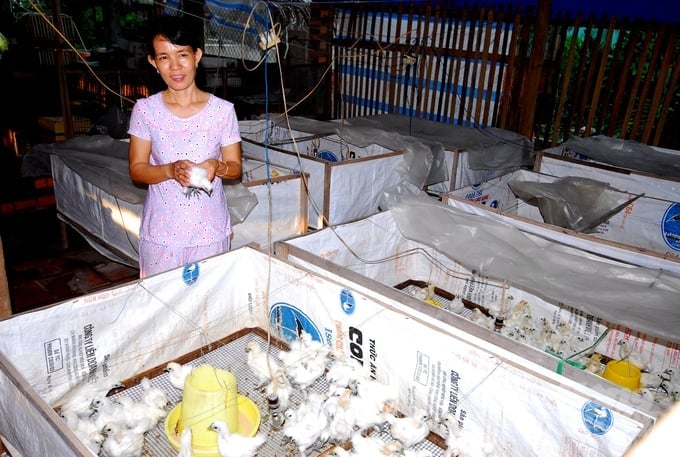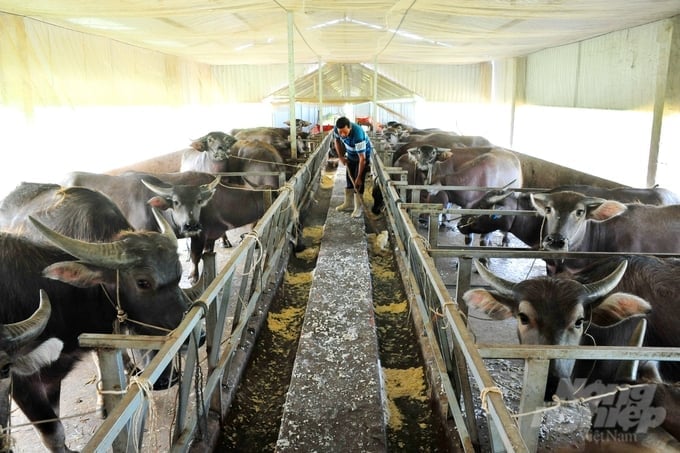November 20, 2025 | 09:10 GMT +7
November 20, 2025 | 09:10 GMT +7
Hotline: 0913.378.918
November 20, 2025 | 09:10 GMT +7
Hotline: 0913.378.918

The agricultural sector in Can Tho city recently launched a comprehensive month-long sanitation, disinfection, environmental detoxification, and prevention campaign against livestock, poultry, and aquatic diseases. Photo: Le Hoang Vu.
Mr. Pham Truong Yen, Deputy Director of Can Tho city's Department of Agriculture and Rural Development, stated that the the city is currently implementing the second phase of the campaign dictated under Official Document No. 5838 dated August 22, 2023, issued by the Ministry of Agriculture and Rural Development. Accordingly, the campaign involves a month-long comprehensive sanitation, disinfection, and environmental detoxification activities nationwide in 2023.
The objectives of this campaign are to proactively prevent the occurrence and spread of dangerous livestock and poultry diseases, and prevent the transmission of diseases from animals to humans, ensuring the safety of livestock development.
For concentrated livestock and poultry farming facilities, it is necessary to illuminate the surrounding vegetation, clean and collect waste for incineration or burial, and maintain proper drainage. In addition, it is important to detoxify and disinfect the livestock housing area, breeding areas, and the surrounding vicinity on a weekly basis. Vehicles used in the transportation of livestock, poultry, livestock products, and feed must also undergo sanitation, detoxification, and disinfection before entering and leaving the facilities.
For households engaged in livestock production, it is essential to clean the enclosed areas for livestock and poultry, including grazing and waste collection areas, and collect and dispose of bedding materials by either incineration or burial. Weekly disinfection of the enclosed area for livestock and poultry and the surrounding vicinity is required. Thorough sanitation of transportation vehicles and equipment should be employed after each operation.

For poultry and waterfowl hatching facilities, it is necessary to illuminate the surrounding vegetation, thoroughly clean the incubation area, entrance and exit, and collect eggshells after hatching for regulated disposal. Photo: Le Hoang Vu.
For poultry and waterfowl hatching facilities, it is necessary to illuminate the surrounding vegetation, thoroughly clean the incubation area, entrance and exit pathways, and collect eggshells after hatching for regulated disposal. Disinfection should be carried out for the entire hatching facility, entrance and exit pathways, and all vehicles used for transporting newly hatched eggs and poultry on a daily basis.
Concentrated livestock and poultry slaughterhouses must areas for holding livestock and poultry before slaughter. After the animals have been taken for slaughter, the entire holding area must undergo sanitation, detoxification, and disinfection. Vehicles used for transporting animals and animal products must be sanitized, detoxified, and disinfected before leaving the slaughterhouse. Moreover, the slaughterhouse must be sanitized, detoxified, and disinfected after each production shift, and the surrounding vegetation and drainage must be regularly maintained.
Processing facilities for animals and animal products must undergo regular sanitation, detoxification, and disinfection after each production shift. Collection points and the trading areas in livestock markets for live animals and animal products must also undergo sanitation, detoxification, and disinfection after each market session.

For households engaged in livestock production, it is necessary to thoroughly clean the enclosed areas for livestock and poultry, including grazing areas, and collect and dispose of manure and bedding materials by either incineration or burial.
In areas dedicated to the quarantine and inspection of animals, it is imperative to conduct routine sanitation and disinfection procedures, with a minimum frequency of once per week during the duration of the animal quarantine period. Furthermore, public spaces, streets, and alleyways must undergo sweeping, cleaning, and disinfection on a weekly basis, in accordance with local initiatives. Regarding the transport of animals and animal products, it is crucial to employ regular sanitation and disinfection protocols following each operation.
For locations involved in the interment, processing, and disposal of afflicted animals and animal products, disinfection procedures must be carried out in compliance with local guidelines. Additionally, a consistent regimen of sanitation and disinfection for vehicles employed in the transportation of animals and animal products must be implemented at animal inspection stations and checkpoints.
Mr. Pham Truong Yen emphasized that an extensive campaign will be undertaken from September 25, 2023 until September 29, 2023 to disseminate information and mobilize households and livestock facilities to deploy production area sanitation and environmental sanitation activities. Subsequently, from September 30, 2023 to October 25, 2023, the sanitation and disinfection campaign will be deployed. From October 26, 2023 to October 31, 2023, there will be an evaluation and reporting phase concerning the campaign's implementation.
Translated by Nguyen Hai Long

(VAN) This is the study conducted by IRRI and Can Tho University on the rice straw value chain in Mekong Delta showing an economic potential of more than 6.6 trillion VND/year.

(VAN) By participating in cooperative economics, many farmers in Tay Ninh have overcome hardship, mastered clean dragon fruit cultivation techniques.

(VAN) The crossbreeding program in the former Binh Dinh province (now part of Gia Lai) has shown signs of decline, and urgent measures are needed to revive it and sustain past achievements.

(VAN) The agricultural sector agreed on a roadmap to pilot the MRV protocol and expand low-emission rice production from the 2025-2026 winter-spring crop.

(VAN) Agricultural extension officers in Quang Ninh do more than transmit knowledge; they have become a steadfast support system for farmers on the path to sustainable agricultural development.

(VAN) The development of a high-quality beef cattle herd has brought major benefits to livestock farmers, creating jobs and enabling better use of agricultural by-products.

(VAN) In the eastern region of Gia Lai, crossbred cattle now account for 93%, forming a high-quality beef herd and establishing a recognized brand, the result of 35 years of persistent effort.